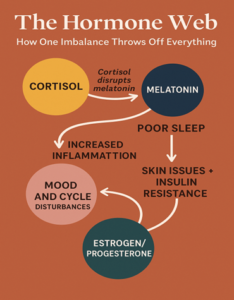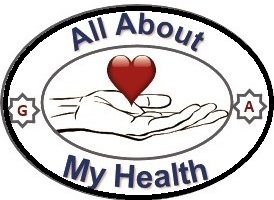Introduction: When “Healthy Habits” Aren’t Enough
You eat clean, work out, meditate, and even swap your coffee for adaptogen-laced matcha lattes—but you’re still exhausted, your skin is acting up, breaking out, or riding emotional roller coasters. Sound familiar?
If that hits home, you might be battling a quiet but powerful force: hormonal imbalance.
Welcome to the world of hormone havoc—a sneaky, often-overlooked root cause of chronic wellness issues. Hormones are your body’s internal chemical messengers, managing everything from your sleep and energy to your skin and mood. When they’re in sync, you feel balanced and vibrant. But when even one of these key players goes off course, the ripple effects can be massive—and confusing. It can send your entire system into a tailspin.
The kicker? Many of these imbalances go undetected—especially if your labs look “normal.” Many wellness enthusiasts unknowingly suffer from low-grade hormonal imbalances that sabotage their daily routines, despite their best intentions. You might blame it on burnout, aging, or “just life,” but there’s often something deeper going on under the surface.
In this article, we’ll explore:
- The most common hormonal culprits impacting your well-being
- How they affect your sleep, skin, and stress
- What symptoms to look out for (even subtle ones!)
- Natural ways to restore balance without relying on medication
- Self-assessments, testing options and natural interventions that work
- Lifestyle shifts to support lasting hormonal harmony
- A downloadable quiz + infographic to help you decode your hormone health
Let’s dive in—because when your hormones work with you, everything else gets easier.
Hormones 101 – The Unsung Heroes of Daily Wellness
Hormones are the chemical messengers your body uses to coordinate nearly every physiological process—like a behind-the-scenes conductor orchestrating a symphony. From when you wake up to how you digest food, deal with stress, or fall asleep at night, hormones are always working.
Some of the major players in your daily wellness include: 
- Cortisol: The primary stress hormone—helps your body respond to danger but too much disrupts sleep, digestion, and immunity.
- Melatonin: Regulates your sleep–wake cycle.
- Estrogen & Progesterone: Crucial for reproductive health, but also affect skin, sleep, and mood.
- Thyroid hormones (T3, T4): Manage metabolism, energy, and brain function.
- Insulin: Controls blood sugar; key to preventing inflammation and energy crashes.
- Testosterone (even in women): Supports mood, libido, and skin integrity.
These hormones don’t work in isolation. When even one of these goes off, the others often follow. Hormones operate in an interconnected system—like a web. Disrupt one, and you create imbalances elsewhere.
The Sleep Connection – Sleepless Nights? It Could Be Your Hormones
You’re in bed at 10 p.m., but suddenly wide awake at 2 a.m.—again. Or maybe you wake up feeling like you haven’t slept at all. This frustrating pattern could be a result of hormonal miscommunication.
Here’s what might be going on hormonally:
Here’s how it works:
- Cortisol & Melatonin Conflict: These two hormones are meant to follow a rhythm—cortisol rises in the morning to wake you up, melatonin increases at night to help you sleep. But chronic stress can flip this rhythm, making you alert at night and groggy all day.
- Low Progesterone: Progesterone’s Calming Effect: Often called nature’s Valium, progesterone supports GABA (a calming brain chemical). Low levels can lead to anxiety and insomnia, especially during the second half of the menstrual cycle.
- Thyroid Imbalance: An underactive thyroid (hypothyroidism) can cause persistent fatigue even if you’re sleeping 8+ hours a night.
- Insulin Rollercoasters (Blood Sugar Spikes): If insulin isn’t working properly, nighttime blood sugar crashes can wake you up at odd hours—often around 2–4 a.m.
Supportive Solutions:
- Morning sunlight to reset circadian rhythm
- Magnesium glycinate before bed to support deep sleep
- Avoid blue light before bed, No screens 1 hour before sleep
- Mindful evening routines— Wind-down rituals: reading, stretching, journaling
Skin Acting Up? Don’t Just Blame Your Products. Skin Deep – When Breakouts and Dryness Are a Hormonal Red Flag
Skin is your body’s biggest hormone mirror. Many people treat skin issues like surface problems, but your skin is one of the first places hormonal imbalance shows up. When things go haywire inside, your skin shows it.
What’s happening beneath the surface:
- Estrogen Decline: Estrogen helps keep skin plump, elastic, and hydrated. When it dips (from stress, birth control, or menopause), you may notice dryness, dullness, and fine lines.
- Low Progesterone: Progesterone influences oil production and inflammation. Too little, and you might get acne during your cycle or increased sensitivity.
- High Cortisol: Cortisol (again!) increases oil production and can cause breakouts, especially on the jawline or chin. It also degrades collagen—speeding up aging.
- Insulin resistance triggers excess androgens (like testosterone), which drive oily skin and persistent acne.
Natural Support:
- Zinc: Helps regulate testosterone
- DIM (Diindolylmethane): Supports estrogen metabolism
- Seed cycling: Natural hormone-balancing approach using flax, pumpkin, sunflower, and sesame seeds
- Clean up your skincare: avoid endocrine disruptors like parabens, phthalates, and synthetic fragrance
10 Subtle Signs You Might Have a Hormone Imbalance
- Trouble falling or staying asleep
- Midday energy dips
- Acne or breakouts post-teens
- Thinning or dry skin
- Irregular or heavy periods
- Anxiety or mood swings
- Low sex drive
- Brain fog or forgetfulness
- Cold hands/feet
- Unexplained weight gain or loss
Stressed & Spinning Out – How Hormonal Imbalance Affects Mood & Mental Clarity
Mood changes often get brushed off. But if you feel wired, foggy, down, or emotionally unstable, your hormones might be to blame.It’s easy to blame mood swings on a bad day or bad sleep, but hormones may be the real culprits. Cortisol, estrogen, thyroid hormones, and blood sugar all affect how your brain works. Here’s how:
The Mood–Hormone Connection:
- High cortisol triggers anxiety and panic. Chronic elevation can reduce serotonin, your feel-good neurotransmitter.
- Low estrogen affects serotonin and dopamine levels—leading to depression, especially around your period or during perimenopause.
- Thyroid dysfunction: Can cause mood swings, fatigue, anxiety, and brain fog that mimic depression.
- Adrenal fatigue (controversial but real to many wellness seekers) leads to emotional flatness and irritability.
- Blood Sugar Crashes: Affects emotional stability just as much as physical energy.
The Gut-Hormone-Mood Link:
Gut bacteria help produce neurotransmitters. Imbalanced gut → leaky gut → systemic inflammation → worsened mood + hormonal instability.
Wellness Tools That Help:
- Adaptogens: ashwagandha, rhodiola, holy basil
- HRV tracking to monitor stress resilience
- Somatic work: breathwork, walking, cold exposure
- Limit caffeine and add more grounding meals
🔗 Related article: Gut-Brain Link: How Your Digestive Health Affects Your Mind – All About My Health
How to Identify Hormone Havoc – Signs, Tests, and Self-Assessments
Many people suffer from hormonal imbalances for years without realizing it. That’s because conventional blood work often misses subtler issues.
Key Symptoms by Hormone Type:
| Hormone | Possible Signs |
Cortisol | Insomnia, anxiety, wired-but-tired feel, belly fat |
| Estrogen | PMS, mood swings, breast tenderness |
| Progesterone | Short cycles, anxiety, poor sleep |
| Thyroid | Brain fog, fatigue, hair thinning, constipation |
| Insulin | Cravings, weight gain, acne breakouts |
Testing Options:
- Saliva testing: Useful for cortisol rhythm and sex hormones
- Blood panels: Thyroid hormones (TSH, free T3, free T4), insulin, estrogen, progesterone
- DUTCH test: A functional medicine gold standard for hormone metabolite mapping
Take the 3-Minute Hormone Self-Assessment
Want to know if you’re dealing with hormone imbalance? Take our quick quiz to identify the top imbalances affecting your energy, sleep, and skin. Discover which hormones may be affecting your mood, skin, and sleep.
3-Minute Hormone Imbalance Self-Assessment (Yes/No):
- Do you feel wired at night but sluggish in the morning?
- Do you experience frequent breakouts, especially around the chin or jawline?
- Are your periods irregular, heavy, or unusually light?
- Do you struggle with unexplained weight gain or difficulty losing weight?
- Do you experience mood swings, anxiety, or irritability before your period?
- Are you waking up between 2–4 a.m. regularly?
- Is your sex drive lower than usual?
- Do you experience brain fog or poor concentration?
- Are your hands and feet often cold?
- Do you feel exhausted even after a full night’s sleep?
Scoring:
- 0–2 Yes: Hormonal health likely in balance
- 3–5 Yes: Mild imbalance—consider lifestyle adjustments
- 6+ Yes: Likely hormonal disruption—testing or support may help
Lifestyle & Natural Interventions to Balance Your Hormones and Restore Hormonal Harmony.
True hormone healing starts with consistent, holistic daily habits. These aren’t quick fixes, but they work at the root.
Nutrition:
- Balance blood sugar with protein + fat at every meal
- Eat cruciferous veggies (broccoli, kale, cauliflower) for estrogen detox
- Avoid refined sugars and inflammatory oils
- Include flax, pumpkin, and sesame seeds for natural estrogen/progesterone support
Movement:
- Gentle strength training supports thyroid + testosterone
- Avoid overtraining: chronic HIIT can spike cortisol
- Incorporate rest days and recovery
Detox Your Environment:
- Use a water filter and glass containers
- Ditch conventional perfumes and cleaning products
- Switch to hormone-safe skincare and cosmetics
Nervous System Nourishment, Mind-Body Healing:
- Yoga, meditation, nervous system regulation
- Prioritize 7–9 hours of sleep over screens (screens off early!)
- Boundaries: avoid overcommitting and overstimulation
The Hormone Reset Daily Checklist:
Daily Habits to Balance Your Hormones Naturally
Morning
- ☐ 10–15 mins sunlight exposure
- ☐ High-protein breakfast with healthy fats
- ☐ Limit caffeine before breakfast
- ☐ Gentle movement/stretching
Midday
- ☐ Eat every 3–4 hours to stabilize blood sugar
- ☐ Hydrate with filtered water
- ☐ 5-minute mindfulness or breathwork check-in
- ☐ Avoid multitasking during meals
Evening
- ☐ Blue-light blockers or screen-free 1 hour before bed
- ☐ Light dinner, avoid sugar and caffeine
- ☐ Magnesium glycinate or calming tea
- ☐ Sleep in a cool, dark room
Bonus Weekly Practices:
- ☐ Seed cycling (flax/pumpkin → sesame/sunflower)
- ☐ Yoga or somatic movement 2–3x/week
- ☐ Replace one beauty/cleaning product with hormone-safe version
Conclusion: Your Hormones Want to Help You—Let Them
Your body isn’t broken—it’s just trying to tell you something. You don’t need to accept fatigue, mood swings, and unexplained breakouts as your new normal. Often, they’re signs your hormones are out of balance—and your body is asking. By tuning into the symptoms and making supportive shifts, you can stop the cycle of frustration and finally feel balanced again.
Your glow, your peace, and your energy? They’re all just a few hormone-friendly habits away.
- Hormone imbalance is common, but not normal—and it’s fixable.
- Tune into your bodies and advocate for your wellness.
- Track symptoms, consider testing, or explore integrative help.
- Join a wellness community.
